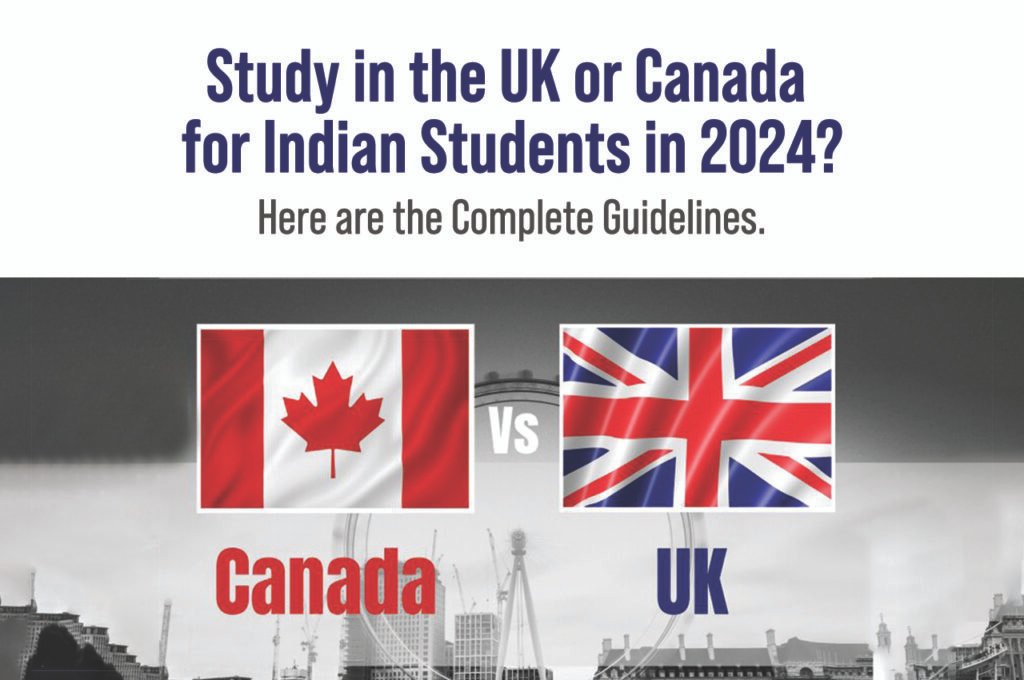

Canada and the United Kingdom are both the countries topping the charts whenever any Indian student thinks of studying abroad. But there is always confusion in the Indian student mind regarding which is the best country for them. There are multiple factors that will help in deciding the country.
In 2023, Canada crossed the 1-million mark for international students. At 37%, students from India formed the largest chunk of international students who went to Canada on study visa.
The UK Home Office has reported a substantial 54% increase in the number of sponsored study visas granted to Indian students compared to 2022. This development marks a significant shift in favour of the UK as a preferred destination for Indian students seeking higher education.
Canada vs UK: Tuition and Lifestyle Expenses
Tuition Fees in the UK:
- Undergraduate Programs:
Tuition fees for undergraduate programs in the UK typically range from £10,000 to £16,000 per year for international students. However, fees for medical degrees and some programs may be higher.
- Postgraduate Programs:
Tuition fees for postgraduate programs (master’s degrees) in the UK vary widely depending on the program and institution. On average, international students can expect to pay between £12,000 to £20,000 per year. However, fees for some program subjects may be higher.
- Doctoral Programs (Ph.D.):
Tuition fees for Ph.D. programs in the UK are often lower compared to master’s programs. International students may pay between £10,000 to £25,000 per year for Ph.D. studies, depending on the institution and field of study.
Also Read: [The Ultimate Guide to Pursuing a Bachelor’s Degree in the UK after completing 12th In 2024]
Tuition Fees in Canada:
- Undergraduate Programs:
Tuition fees for undergraduate programs in Canada vary by province, institution, and program of study. On average, international undergraduate students can expect to pay between CAD 20,000 to CAD 40,000 per year for tuition fees. However, fees may be higher for programs in fields like engineering, business, and medicine.
- Postgraduate Programs:
Tuition fees for postgraduate programs (master’s degrees) in Canada are typically higher than undergraduate fees. International students may pay between CAD 20,000 to CAD 50,000 per year for master’s programs, depending on the institution and field of study.
- Doctoral Programs (Ph.D.):
Tuition fees for Ph.D. programs in Canada are often lower compared to master’s programs. International students may pay between CAD 10,000 to CAD 30,000 per year for Ph.D. studies, depending on the institution and field of study.
Before applying to any program, it’s advisable to research the specific tuition fees for your chosen institution and program and consider additional expenses such as accommodation, living costs, and study materials. Additionally, you can take a help of study in abroad consultancy
Canada vs UK: Visa Requirements and Process
The processing time for visas to study in the UK and Canada can vary depending on several factors. Here’s a general overview of the processing times for study visas in both countries:
Processing Time for UK Study Visa (Tier 4 Visa):
Standard Processing Time:
The standard processing time for a UK study visa (Tier 4 visa) can vary depending on the country where you apply. Generally, it takes around 2 to 3 weeks for a decision to be made on a Tier 4 visa application submitted outside the UK.
Priority Processing:
Some UK visa application centers offer priority processing services for an additional fee. With priority processing, you may receive a decision on your visa application within 5 to 10 working days.
Super Priority Processing: In some cases, UK visa application centers offer super priority processing services for an even faster decision. With super priority processing, you may receive a decision on your visa application within 24 hours.
Processing Time for Canada Study Permit:
Standard Processing Time:
The standard processing time for a Canada study permit can vary depending on the country where you apply. Generally, it takes around 4 to 6 weeks for a decision to be made on a study permit application submitted outside Canada. The processing time may be longer during peak seasons or for certain nationalities.
Expedited Processing:
Canada offers the Student Direct Stream (SDS) program for students from certain countries, which provides expedited processing for study permit applications. With SDS, you may receive a decision on your study permit application within 20 calendar days.
Biometric Enrolment:
In addition to the processing time for the study permit application, you may need to attend a biometric enrolment appointment. The processing time for biometric enrolment varies depending on the availability of appointment slots at the Visa Application Center (VAC) in your country.
Duration of courses-
The duration of undergraduate courses in the UK and Canada can vary depending on factors such as the field of study, the specific program, and the university. However, there are some general differences:
1.Undergraduate Programs in the UK:
- Most undergraduate programs in the UK typically last for three years, especially in England, Wales, and Northern Ireland.
- In Scotland, undergraduate degrees traditionally last for four years.
- Some specialized programs like medicine, dentistry, and certain engineering disciplines may have longer durations.
2.Undergraduate Programs in Canada:
- Undergraduate programs in Canada generally have a longer duration compared to the UK.
- Bachelor’s degrees typically span four years in Canada, although some programs may be completed in three years, especially in provinces like Quebec.
- Co-op or internship opportunities may extend the duration of some programs.
The duration of master’s programs in Canada and the UK can vary depending on several factors, including the specific field of study, program structure, and individual university requirements. However, here’s a general comparison:
Canada:
1.Course-Based Master’s Programs: Typically last for one to two years, with the majority being two years. Some programs may offer an accelerated option for completion in one year, especially if they don’t require a thesis or major project.
2.Thesis-Based Master’s Programs: Generally last for two years, though some may extend to three years, especially if the research project is extensive.
3.Professional Master’s Programs: Programs like the Master of Business Administration (MBA) or Master of Engineering (MEng) usually range from one to two years, depending on the program structure and whether it includes co-op or internship components.
UK:
1.Taught Master’s Programs: Typically last for one year, making them shorter than many programs in Canada. However, some programs may offer variations, such as 9-month intensive courses or programs with an extended project or placement component that can last longer.
2.Research-Based Master’s Programs: These programs, such as Master of Research (MRes) or Master of Philosophy (MPhil), generally last for one to two years, depending on the nature of the research project and university requirements.
Canada vs UK: Benefits
Why Study in the UK?
When considering studying in the UK, students can benefit from:
- The National Health Service (NHS) ensures healthcare access for all citizens.
- An efficient and reliable transportation system facilitating easy travel.
- Scenic natural beauty and picturesque landscapes to explore.
- Free admission to art galleries and museums, enriching cultural experiences.
- The UK’s status as a global financial center, offering opportunities for networking and career growth.
- Comprehensive labor laws and employee benefits ensuring a favorable work environment.
Why Study in Canada?
On the other hand, Canada offers its own unique set of advantages for students:
- Access to free healthcare services for everyone, promoting well-being and safety.
- A low crime rate contributes to a secure and peaceful living environment.
- Employment opportunities are available for both locals and immigrants, fostering diversity and inclusivity.
- Affordable education options, making higher education accessible to a wider population.
- Expansive and breathtaking landscapes, provide opportunities for outdoor adventures and exploration.
- Relatively low cost of living, allowing students to manage expenses more efficiently.
Wrapping Up
Drawing a conclusion on the comparison between Canada and the UK involves considering various aspects such as economy, culture, politics, quality of life, and more. Here’s a balanced conclusion:
1.In the UK, after 12th one can directly apply for a bachelors program in University, whereas in Canada , mostly students apply for a diploma in colleges because of tuition fees , eligibility criterias etc.
2.The duration of bachelor’s in the UK is 3 years and masters mostly 1 year whereas in Canada bachelors is 4 years and masters 2 years.
Choosing between Canada and the UK for higher education involves weighing various factors such as academic preferences, lifestyle choices, and career aspirations. At Nationwide Overseas Education, we specialise in providing expert guidance and assistance to Indian students seeking to study abroad. Contact us today to explore your options and embark on your educational journey with confidence!

